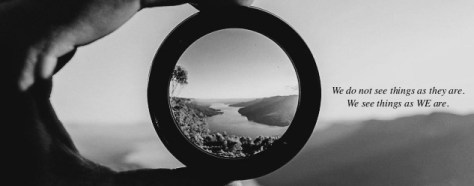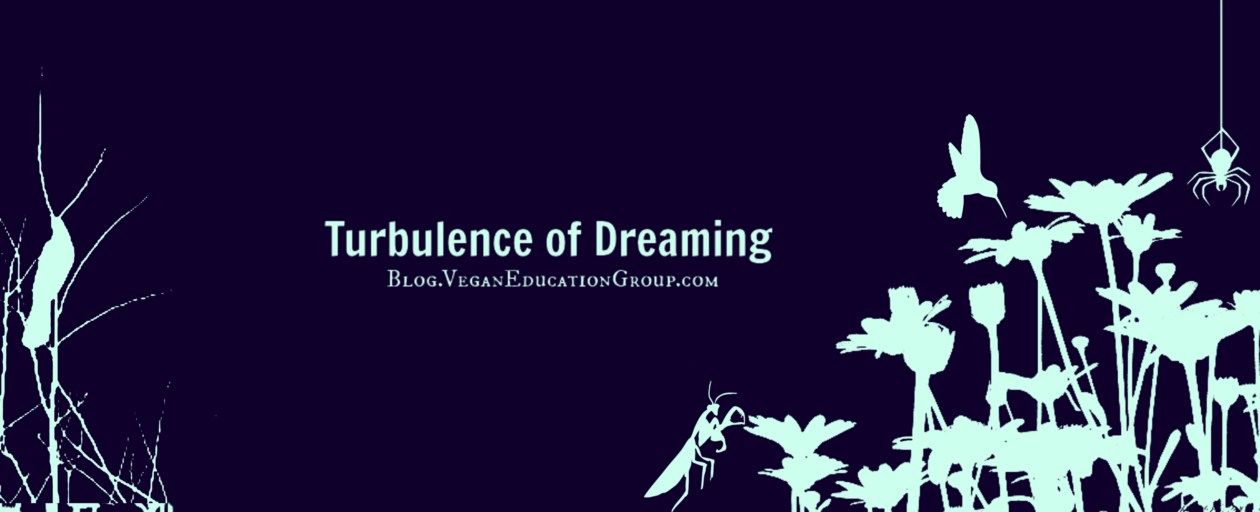
Our Perspective is Our Reality
Lately, I’ve been questioning whether there is a fundamental flaw in my thinking.
I tend to operate under the assumption that, when given the option, people would prefer to live with moral integrity. When asked whether they think it’s wrong to hurt and kill the vulnerable for pleasure, most (if not all) of the people I meet say “yes”. Much as I and others work to provide them with incontrovertible evidence that, if one believes it’s wrong to unnecessarily harm and kill innocent, vulnerable sentient beings to satisfy one’s pleasure, comfort or convenience, the only logical response is to start living vegan as soon as possible, many resist and make the choice to continue benefitting from the injustices inherent in animal use – thereby living in direct opposition to the moral standards they profess to hold.
Could the problem be that the people I meet have no true desire to live up to their own standards in instances when to do so would prevent them from getting what they want, preferring instead to violate their own moral boundaries in an ongoing quest for self-satisfaction? For example, for those of us who understand that robbing a bank is wrong because taking that which does not belong to us is fundamentally unjust, would we do it anyway if no one was looking and we wouldn’t get caught?
“I knew I was ‘hitting bottom’ when I was violating my standards faster than I could lower them” – Recovering member of Alcoholics Anonymous
This excerpt from a previous essay helps explain why this phenomenon occurs:
…the innate human characteristics of selfishness (“What’s in it for me?”), laziness (“How much energy am I going to have to spend on this?”) and a desire to be right at all costs (“I’m right, you’re wrong… and I’m also right!”) set up stumbling blocks to accepting new and vital information. The result is defensiveness born of cognitive dissonance (“If what you’re telling me is true, that means my firmly-held beliefs are wrong and I’ll need to make significant changes… and that can’t be simply because it can’t be, so clearly you’re wrong and I’m right because I believe I’m right!”) and an almost impenetrable wall of denial is immediately constructed.
Or perhaps the problem is that the people I meet just don’t have a clear understanding of what values make up their moral compasses, so they follow the crowd and rarely, if ever, question the speciesist societal indoctrination they’ve been exposed to since birth that tells them non-human animals are exempt from the moral community, have no real rights and therefore can be used and exploited for the benefit of humans.
When applied to vegan advocacy, the Socratic method is an invaluable tool for helping non-vegans quickly understand what their morals are where animals are concerned and how veganism is in line with the values in which they already believe.
Here’s an example of Socratic questioning in a vegan advocacy setting:

Being Conscious of Our Conscience
I do my best to live in accordance with my moral compass and am sure that I fail to live up to my own standards almost daily in some aspect of my life or another, but I am far from claiming to be perfect in any way. I just do the best I can with what I have and, when I realize I’ve done less than my best and violated a boundary, I admit my transgression as promptly as I’m able and amend my behavior so I can do better the next time and recover my serenity in the process.
Prior to embracing 12-step recovery to heal from the traumatic effects of having lived in close proximity to others’ active addictions, I used to believe that I didn’t have a conscience. To the casual observer, based on many of my choices and behaviors the first 26 years of my life, this might have appeared to be the case. One day I mentioned this to another recovering person who gently suggested to me, “You always had a conscience – you just didn’t listen to it.”
And with that, the atomic bomb of truth landed right in my lap.
BOOM.
Once again, our perspective is our reality.
Over the past 23 years, I have come to understand and incorporate the Twelve Steps as guidelines for living an emotionally healthy life, and part of my process in “working” the Steps involved making a “searching and fearless moral inventory” of myself. Much has been written and shared about this particular step on the recovery path that many seem to find daunting and too tall an order to complete (it’s often said that the Twelve Steps are a “simple program for complicated people”), but a friend broke it down to its essence for me by saying, “Dude, I inventoried my morals” and it suddenly sounded manageable. I came to realize that I didn’t really know what my morals were – what were the values I held dear and believed in to the core of my being? What were my basic beliefs about right and wrong? Did I have my own moral code or was I only watching others and taking my cues from them?
Prior to making my own moral inventory, I could only guess at the answers to such questions and finally wanted to know, so with the guidance of a trusted friend I dove in and did the work.
Consider this passage from an Al-Anon publication:
“My Fourth Step inventory helped me discover who I am, what my values are, the behavior I’d like to keep, and the things I’d like to change. With this in mind, I am working to establish new behavior that reflects my integrity and expresses my true values. Where in the past I have accepted unacceptable behavior [from myself and others – Editor], I now can choose a different response. I must consistently do what I say I’m going to do. Today I have the courage and faith to be true to myself, whether or not others like or agree with me.” – Courage to Change, Al-Anon Family Groups, p. 345
Once I’d done a good deal of introspective self-examination and completed my moral inventory, I had a much clearer understanding of what I believe in/what I don’t believe in, which behaviors of mine are acceptable/unacceptable to me, what my core values are and who I truly want to be as a person. In short, I came to know – and embrace – who I am. I became able to identify and enumerate those values that comprise my moral compass and began setting internal boundaries for my behaviors. I began living and behaving in ways that were in line with my values and I became more and more comfortable with myself. It became clear that the more I listened to my conscience, the less anxiety I created for myself and I found that each time I transgressed my own boundaries and stepped out of integrity with my morals by choosing not to listen to my conscience yet again, I felt a familiar sense of shame. This was the same feeling that had haunted me all those years I’d lived contrary to who I really was, acting out unhealthily in reaction to the toxic cloud of other peoples’ addictions that was everpresent in my life. It was this feeling that kept me believing I was unworthy of everything – love, acceptance, friendship, family, happiness, success… oxygen – and I knew I no longer wanted to willingly engage in behaviors that would invite my shame to return like a vampire to suck the blood from my soul and leave me cold, empty and nearly lifeless again… and again… and again.
A Literal Moment of Truth
On that night nearly thirteen years ago when I was suddenly confronted with evidence that, by living non-vegan, I was undeniably complicit in, supporting and promoting a worldwide system of enslavement, exploitation and execution of vulnerable sentient beings, I had a choice to make:
Knowing the truth of the consequences of my choices, do I continue to fund and personally benefit from these injustices… or do I do the right thing and cease my complicity in them immediately by living vegan?
I knew almost instantly that my only acceptable course of action was to begin living vegan right then and there, and here’s why:
I understood from my Fourth Step inventory that I place a high value on justice, fairness, honesty and integrity, so I do my best each day to live in a way that honors those values. When I fall short, there is another part of the Twelve Step process that is extremely beneficial in helping me get back on track, and that’s the Tenth Step.
Step Ten – Continued to take personal inventory and when we were wrong promptly admitted it.
Until I was shown the truth about animal exploitation that night in 2004, ten years after my recovery journey began, I was ignorant – and on some level, willfully so – as to the part I was playing in it and once I knew, I couldn’t un-know. My mind, my gut and the tears streaming down my cheeks all told one story – all animal use is unjust and I won’t be a part of it any longer.
Simply put, I was wrong. I admitted it. I amended my behavior.
In that moment, I was faced with a moral dilemma. Do I choose to take the selfish route and continue doing what I was doing by rationalizing, justifying, minimizing, intellectualizing, blaming, shaming, deflecting, avoiding and otherwise denying that living non-vegan runs in direct opposition to my core values or do I make one selfless decision to stop victimizing others? Each choice presented its share of consequences, but I knew the consequences of the selfish choice – shame and self-loathing – weren’t ones I was willing to face again, so I made the selfless choice.
My vegan life began that night.

“Humility will help us see ourselves in true perspective and keep our minds open to the truth.” – Al-Anon’s Courage to Change
I make no claims that I take or have taken morally higher ground than others nor that mine is necessarily an example to follow. I only wonder whether my Twelve Step way of living, the moral inventory it suggested I make and the suggestion to take ongoing accountability for my behavior made me somehow more receptive, open and willing, at least in that moment of truth, to making a hard and fast commitment to living vegan than many of the people I meet. I am certainly not suggesting that embracing the Twelve Step philosophy is a prerequisite for embracing veganism nor that it’s some sort of universal missing piece of the puzzle, as I know others in recovery who have been exposed to the truth about animal exploitation and continue to personally benefit from those injustices, however I do believe that immersion in some sort of moral inventory process is crucial if one is to have any chance of fully understanding one’s own moral compass and living in integrity.
My feeling is that my moral inventory was a critical piece for me since I would almost certainly not be living vegan today had it not been for the Step work I did that led me first to define my morals and then commit to living by them as best as I’m able one day at a time.
[I encourage all readers to click the blue links embedded in this essay and explore the information on those sites. Also, please read our Disclaimer regarding external sites, organizations, individuals, etc.]

